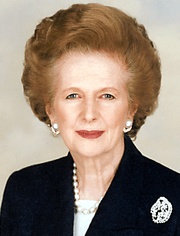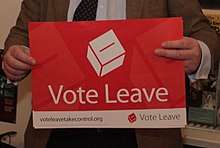Bruges Group (United Kingdom)
| Part of the politics series on |
| Thatcherism |
|---|
 |
|
The Bruges Group is a eurosceptic think tank based in the United Kingdom. It campaigns against the notion of an "ever-closer union" in Europe and, above all, against British involvement in a single European state. Although the group is often associated with the Conservative Party, it is formally an independent all-party think tank, and some Labour MPs and peers have addressed their meetings through the years, such as Frank Field, Gisela Stuart, Lord Stoddart of Swindon and Baron Shore of Stepney. The Bruges Group's honorary president was Margaret Thatcher. Currently, the president is Lord Tebbit of Chingford and its chairman is Barry Legg, who was chief executive of the Conservative Party and a former Member of Parliament.
Background
Founded in February 1989, the Bruges Group's original aim was to promote the idea of a less centralised European structure than what they felt was emerging in Brussels. It was established by Lord Harris of High Cross and Oxford University student Patrick Robertson in response to Margaret Thatcher's Bruges speech[1] in September 1988, in which she remarked that, "We have not successfully rolled back the frontiers of the state in Britain, only to see them re-imposed at a European level". The Bruges Group's research now includes looking into alternative international relationships for the UK and a complete restructuring of Britain's relationship with other European countries.[2]
The 1980s and 1990s
Following Margaret Thatcher's speech and the group's establishment, it quickly became a focus for British Eurosceptic opinion and opposition to the then president of the European Commission, Jacques Delors. The Bruges Group is considered to be the common ancestor of the many British eurosceptic parties and groups that emerged in the 1990s.
The group was a rallying point for rebellious backbench Conservative MPs during House of Commons debates over the Maastricht Treaty.[3]
Lord Harris, who had been general director of the Institute of Economic Affairs 1957 to 1988, was chairman from 1989 until 1991 when he was replaced by professor Kenneth Minogue.[4]
In 1993, Dr Martin Holmes and Dr Brian Hindley became co-chairmen of the Bruges Group.[5] Jonathan Collett became campaign director in 1993 and held the role until 2001.[6]
The Bruges Group became the most influential eurosceptic group in the 1990s[7] holding regular meetings and regularly publishing occasional papers.[8]
Its first annual conference was held in 1994 at King's College and has been held there ever since. The Bruges Group played a leading role in stopping the UK entering the euro.[9] Martin Holmes' publication of "The Conservative Party and Europe" had a strong influence on William Hague.[10]
Dr Martin Holmes continued as co-chairman until 2001.[11] Dr Brian Hindley carried on as co-chairman for a few more years and published a number of papers for the Bruges Group.[12]
Activities
The Bruges Group seeks to keep debate on European issues centre stage by commissioning and publishing independent research and by holding meetings and conferences to discuss relevant issues. These events have covered topics like the European Union, immigration, trade, and the euro, and they seek to inform decision-makers and opinion-formers, especially those in Parliament and the media. The Bruges Group also monitors and assesses the voting of Members of Parliament.[13]
The Bruges Group contends that the EU seeks to extend its influence over individual states’ right to manage their own affairs. As a result, the Group has extended its remit to monitor the EU's policies and regulations relating to the increasing costs of membership, defence, international relations, climate change, national identity, immigration and healthcare.
Internationally the Bruges Group has been particularly active in supporting Euroscepticism in Estonia and discussing issues relating to Turkey and the EU.
2016 Brexit referendum

Through events, meetings, and papers, the Bruges Group played a key part in the 2016 Brexit Referendum in which 52 percent of the UK voted to leave the European Union.[14] Following the Leave campaign's win in the referendum, historian Andrew Roberts credited in part director Robert Oulds and the Bruges Group with keeping the popular insurgency alive over more than four decades.[15]
In the media
The group's director, Robert Oulds, is sometimes quoted in the press and makes regular appearances on TV and radio discussing European issues. Spokesmen for the Bruges Group have also appeared on BBC TV News, ITN; Sky News; The Daily Politics; BBC World Service; BBC R5 Live and international media outlets.[16]
The Bruges Group is also sometimes asked by the media to comment on the topic of the European Union and the Conservative Party.[17]
Social Media
The Bruges Group is active on various social media platforms including Facebook, Twitter, LinkedIn, and Instagram. The group regularly posts updates and information about events, articles, and recently published blog posts, as well as relevant Brexit and EU related news.
References
- ↑ "Speech to the College of Europe ("The Bruges Speech")". www.margaretthatcher.org.
- ↑ Bruges Group website http://www.brugesgroup.com
- ↑ "What is the Bruges Group? | Conservative Home". Conservative Home. Retrieved 2018-03-29.
- ↑ "Lord Harris of High Cross". The Daily Telegraph. 19 October 2006.
- ↑ Holmes, M. (27 November 2001). The Eurosceptical Reader 2. Springer – via Google Books.
- ↑ "Interview in These Tides magazine - The boundaries of EU-Sceptic thought pushed forward". www.brugesgroup.com.
- ↑ "Robert Oulds on the Bruges Group, British Global Alternatives and the End of the EU". www.thedailybell.com.
- ↑ "Against EU integration and British involvement in the creation of a European Union super-state". www.brugesgroup.com.
- ↑ "50 groups behind Article 50 - Part I". brexitcentral.com. 18 March 2017.
- ↑ "The Conservative Party and Europe". www.brugesgroup.com.
- ↑ Holmes, M. (27 November 2001). The Eurosceptical Reader 2. Springer – via Google Books.
- ↑ "The EU moving forward, but holding the world back". www.brugesgroup.com.
- ↑ Bruges Group MP League Table http://www.brugesgroup.co.uk/mp/mplist.php#top
- ↑ "EU Referendum Results". BBC News. Retrieved 2018-03-15.
- ↑ Roberts, Andrew (2016-06-24). "Brexit is a more impressive achievement than the French Revolution". The Telegraph. ISSN 0307-1235. Retrieved 2018-03-15.
- ↑ BBC http://news.bbc.co.uk/1/hi/programmes/business_edition/8701045.stm
- ↑ Daily Politics with Andrew Neil http://news.bbc.co.uk/1/hi/programmes/the_daily_politics/8340299.stm